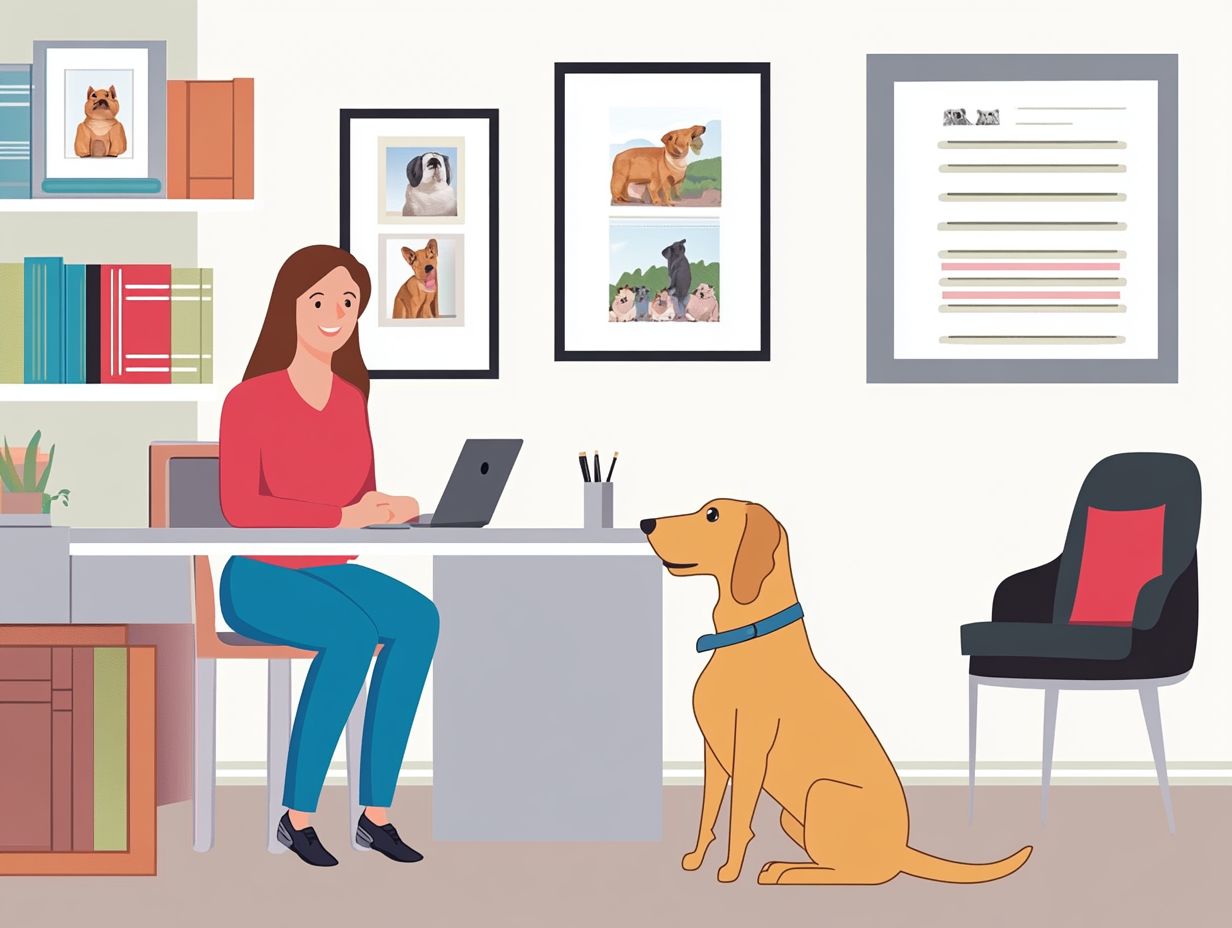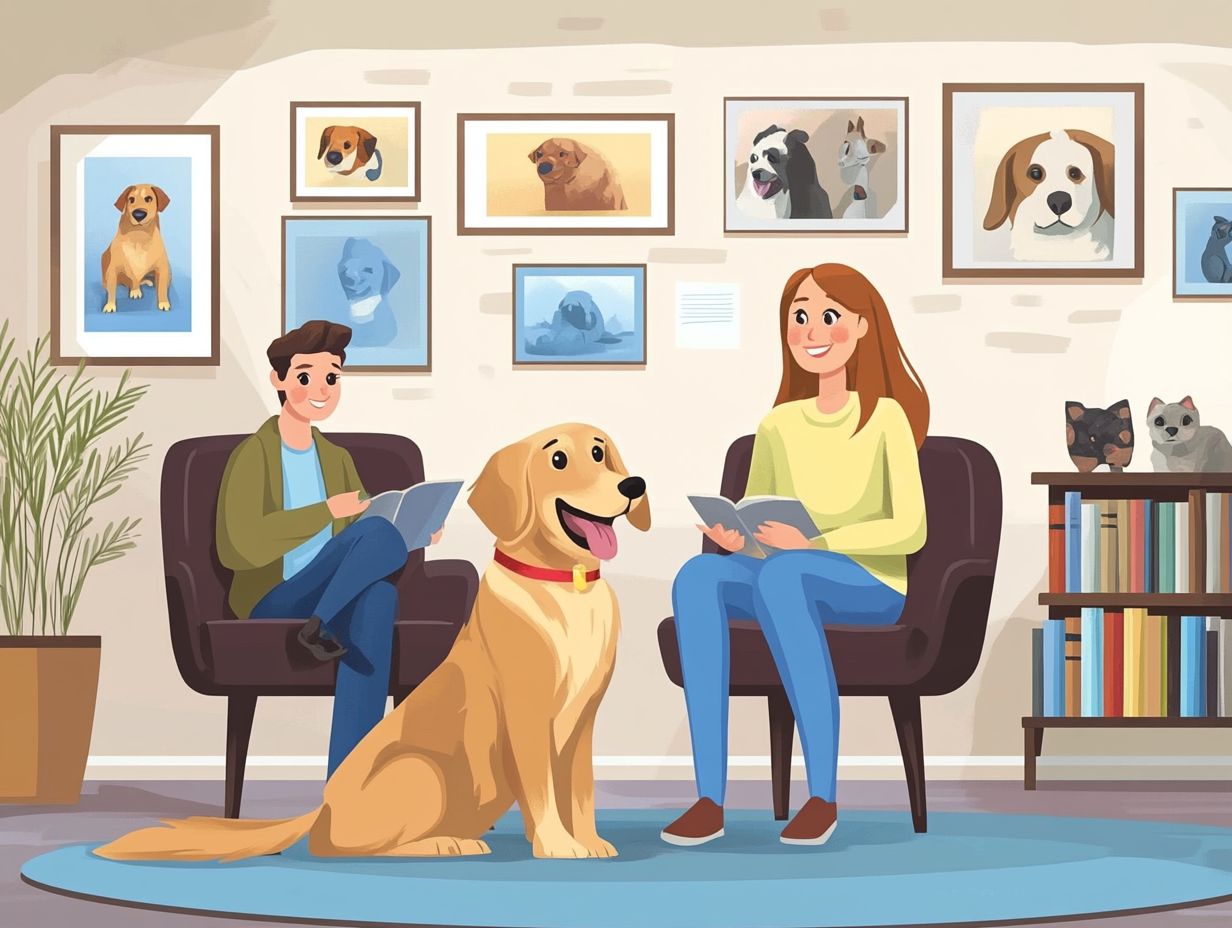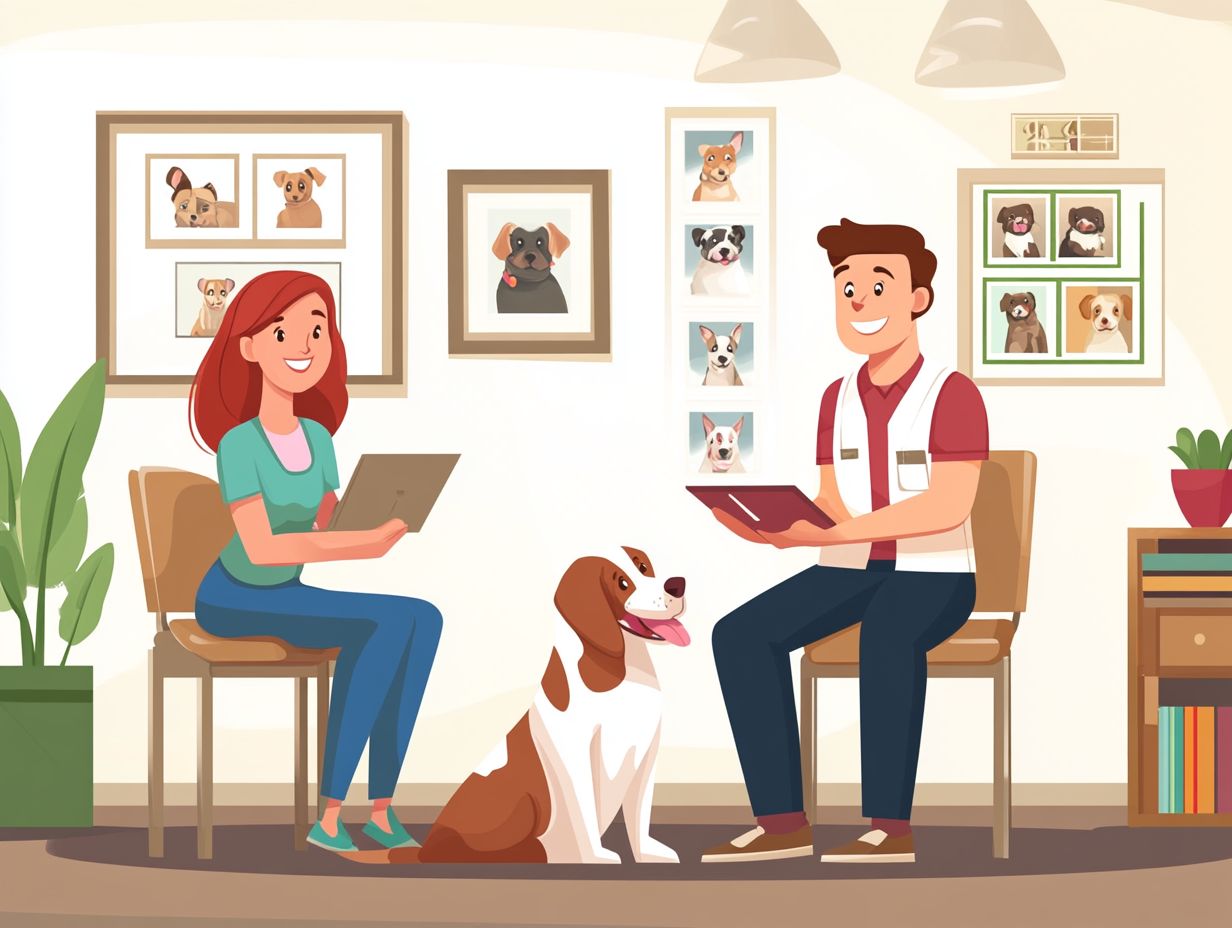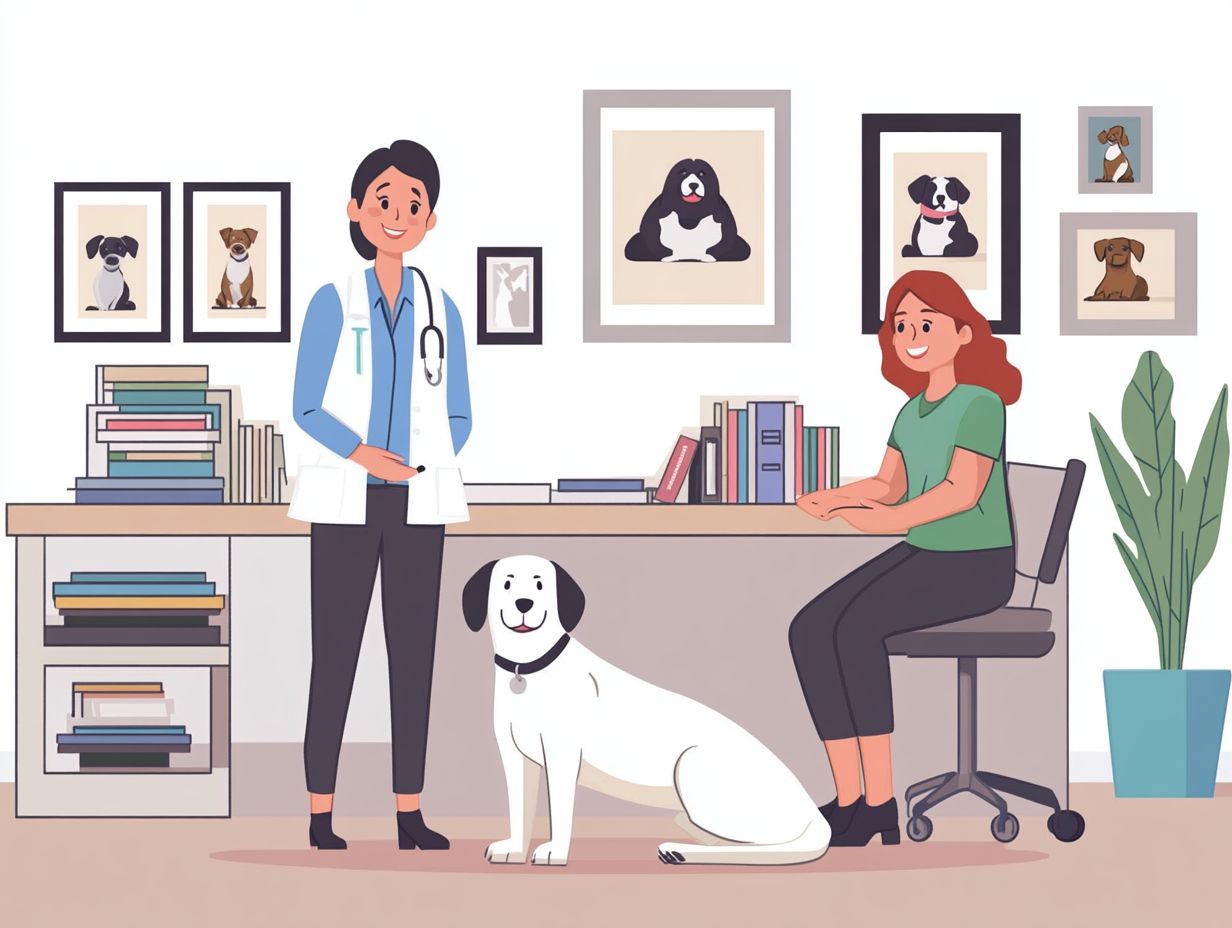What Should I Look for in an Animal Behaviorist?
Curious about how to enhance your pet’s behavior? An animal behaviorist could be just what you need!
This article delves into the role of an animal behaviorist, highlighting the qualifications and certifications you should seek, as well as the various specializations available within the field.
Uncover effective methods and techniques, including positive reinforcement strategies. You’ll also learn how to select the right behaviorist for your furry companion and what to anticipate during your sessions.
Let s discover exciting ways to understand and nurture your pet s behavior!
Contents
Key Takeaways:

- Look for an animal behaviorist with a strong education and training background.
- Consider their specific areas of expertise and methods.
- Evaluate their experience and compatibility with your pet.
What is an Animal Behaviorist?
An animal behaviorist is a professional dedicated to understanding and modifying animal behavior, particularly in beloved pets like dogs. They utilize a range of training methods and techniques grounded in the principles of animal learning, psychology, and ethology (the study of animal behavior), all while focusing on the vital relationship between you and your pet to tackle behavioral challenges.
From deciphering canine body language (the ways dogs express feelings through their bodies) to identifying underlying medical issues, animal behaviorists play a pivotal role in enhancing the lives of pets and their families.
These experts assess a variety of concerns, including aggression, anxiety, and excessive barking, offering personalized solutions that encourage healthy interactions. By implementing ways to change unwanted behaviors, they help reduce problematic behaviors while nurturing a deeper bond between you and your pet.
Their knowledge enhances the emotional well-being of animals and eases stress for pet owners, fostering a harmonious home environment.
The work of an animal behaviorist is essential for improving animal welfare, promoting responsible pet ownership, and enriching the invaluable human-animal connection.
Qualifications and Certifications to Consider
When you re in the market for an animal behaviorist, it s essential to grasp their qualifications and certifications to ensure that your dog receives top-notch care and guidance.
Professionals in this realm typically possess credentials from esteemed organizations like the Certification Council for Professional Dog Trainers, the International Association of Animal Behavior Consultants, and the Animal Behavior Society. These certifications serve as a testament to their expertise in behavior assessment and modification, ensuring you re in capable hands.
Education and Training
To become a proficient animal behaviorist, you need a solid educational foundation in psychology, biology, and animal ethology. These subjects provide the essential insights into animal behavior and learning that will set you apart.
Many behaviorists pursue degrees in psychology or biology, often supplementing their education with specialized training in canine behavior and training methods.
Along with formal degree programs, gaining hands-on experience through internships or volunteer opportunities at animal shelters is invaluable. These real-world settings allow you to observe and interact with dogs from various backgrounds, sharpening your skills in behavior assessment and modification techniques.
Participating in workshops and seminars that focus on the latest research in canine cognition can further enhance your understanding and application of effective training strategies.
Every educational component, from academic study to practical exposure, is crucial in equipping you with the skills necessary to foster healthier relationships between dogs and their owners.
Certifications and Professional Memberships
Certifications and professional memberships are crucial for establishing your credibility as an animal behaviorist.
They showcase your commitment to ongoing education and commitment to animal welfare.
Numerous organizations offer certifications, such as the Certified Applied Animal Behaviorist and the Associate Certified Applied Animal Behaviorist, which highlight your expertise in tackling behavioral issues and implementing effective training programs.
These credentials also serve as a powerful testament to your dedication to the field.
This underscores the importance of continuous learning in the ever-evolving world of animal care.
Organizations like the American Association of Professional Animal Behaviorists and the International Association of Animal Behavior Consultants provide invaluable resources and networking opportunities, helping you stay abreast of the latest research and techniques.
Investing in your professional training boosts your skills and elevates the service you provide to pet owners.
This results in better outcomes for pets and their owners, ensuring a positive impact in your field.
Specializations within Animal Behavior

Animal behaviorists have the opportunity to specialize in a range of areas.
This enables them to hone in on specific behavioral issues and training methods that align with the unique needs of individual pets and their circumstances.
These specializations can encompass working with particular species, such as dogs or cats.
They also involve tackling behavioral challenges like aggression or anxiety, and collaborating with veterinary behaviorists to evaluate any underlying medical conditions that might influence animal behavior.
Areas of Expertise
As an animal behaviorist, your expertise spans a broad spectrum.
This includes topics like canine ethology, behavior modification strategies, and the crafting of effective training programs tailored to the unique needs of individual animals.
This depth of knowledge gives you the power to tackle a variety of behavioral issues,
utilizing positive reinforcement and other training methods to encourage lasting change.
By exploring specific areas such as fear-based behaviors, aggression management, and socialization techniques, you can uncover the underlying reasons behind a dog’s actions.
This insight allows you to create targeted interventions that consider the animal s environment and distinct temperament.
With specialties like operant conditioning a method of learning that uses rewards to encourage good behavior and learning theory under your belt, you ll be well-equipped to refine your approach.
You can offer pet owners actionable strategies that foster harmonious relationships between pets and their human companions.
Understanding the intricacies of dog behavior ultimately enhances communication and significantly improves the quality of life for both you and the animals you work with.
Methods and Techniques Used by Animal Behaviorists
Animal behaviorists use various methods to modify behavior and encourage positive change in pets.
Positive reinforcement stands out as one of the most effective and widely embraced strategies.
These approaches are rooted in the principles of animal learning,
emphasizing the importance of rewarding desired behaviors while minimizing punitive measures.
This creates a healthier and more effective training environment,
ensuring both you and your pet can thrive together.
Positive Reinforcement and Other Approaches
Positive reinforcement is a vital technique you can utilize to encourage desired behaviors in your dog. It lays the groundwork for successful behavior change. By integrating this method with various training approaches, you can craft effective behavior modification programs tailored to the unique needs of both your dog and yourself.
When you reward specific actions with treats, praise, or playtime, you reinforce positive behavior. This significantly boosts the chances of it being repeated. Unlike punitive methods that rely on discouragement through criticism or discomfort, positive reinforcement nurtures a trusting relationship between you and your dog. This approach reduces anxiety and fear while enhancing overall learning, making it a favored choice among trainers.
By grasping the science behind behavior change a method that uses rewards to encourage good behavior you can apply this technique effectively. This promotes a well-adjusted and joyful canine companion.
Choosing the Right Animal Behaviorist for Your Pet
Choosing the right animal behaviorist for your dog is essential for effective behavior modification and nurturing a harmonious pet-owner relationship.
As you embark on this journey, consider key factors such as their qualifications, areas of specialization, training methodologies, and personal experience with specific behavioral issues. This thoughtful approach will help ensure that the behavior consultant aligns perfectly with your pet’s unique needs.
Factors to Consider

When selecting an animal behaviorist, consider several critical factors:
- Experience with specific dog breeds
- Approach to behavior assessment
- Training methods employed
Understanding these elements empowers you to make informed choices that best suit your dog’s unique behavioral needs.
Evaluating the behaviorist’s background and track record is essential. Experienced professionals often bring a wealth of knowledge from past cases that might mirror your dog s issues. Examining their methodologies whether they lean towards positive reinforcement or more traditional techniques greatly influences training effectiveness.
Equally important is the behaviorist’s reputation within the community. Feedback from other pet owners can provide valuable insights into their success rates and overall client satisfaction. Each of these factors plays a pivotal role in ensuring a positive and productive training experience, tailored to the specific challenges you and your beloved pet face.
Working with an Animal Behaviorist
Get ready for an amazing transformation! Collaborating with an animal behaviorist can profoundly enhance your pet’s behavioral transformation, making the journey of change both effective and manageable.
During sessions, behaviorists usually perform a thorough assessment of your pet’s behavior. They craft bespoke training programs meticulously tailored to meet your dog’s unique needs and your personal goals.
What to Expect from Sessions
During sessions with an animal behaviorist, expect a comprehensive behavior assessment. The behaviorist evaluates your dog’s behavior patterns and uncovers the underlying issues contributing to any problematic behaviors. This assessment lays the foundation for creating tailored training methods designed to foster positive behavioral changes.
After the initial evaluation, the practitioner will work closely with you to set clear and achievable goals. These goals are crucial for guiding the training process. The behaviorist will then introduce specific techniques and strategies aimed at modifying undesired behaviors while reinforcing positive actions.
Through consistent monitoring and periodic reassessment, you ll have the opportunity to track your pet’s progress and make any necessary adjustments to the training plan. With a focused approach combining assessment, goal-setting, and targeted training, achieving lasting behavior modification becomes not just a possibility, but a realistic and attainable goal.
Frequently Asked Questions
What Should I Look for in an Animal Behaviorist?
An animal behaviorist is a professional who understands and modifies animal behavior. This can be a valuable resource for pet owners struggling with their pet s behavior. Here are some factors to consider when choosing the right animal behaviorist for your pet.
What qualifications should an animal behaviorist have?

A good behaviorist needs a degree in animal behavior, psychology, or something similar. They should also have experience with various animals and a proven record of successful behavior modification.
Do I need a certified animal behaviorist?
While not all animal behaviorists are certified, it’s highly recommended to choose one who is. A certified animal behaviorist has received specialized training and is held to a higher standard of ethics and professionalism. They must stay updated on the latest research and techniques in animal behavior modification.
What methods and techniques do they use?
Animal behaviorists use various methods and techniques, so it s crucial to ensure they align with your values and beliefs. Some may use punishment methods, which can scare or hurt pets, while others focus on positive reinforcement. Make sure to discuss this with the behaviorist and choose a method you’re comfortable with.
Can I expect a quick fix for my pet’s behavior issues?
Keep in mind, behavior change takes time, but the results can be amazing! It’s essential to have realistic expectations when working with an animal behaviorist. Behavior modification takes patience, and results may vary based on the individual animal and their behavior issues. A good behaviorist will provide a realistic plan and timeline for modifying your pet s behavior.
How can I ensure a good fit with my chosen behaviorist?
Finding the right animal behaviorist isn’t just about qualifications and methods; it’s also about the relationship and communication between you and the behaviorist. It’s important to feel comfortable and trust them, so keep the lines of communication open and honest. Don’t settle for just anyone choose a behaviorist you trust!






